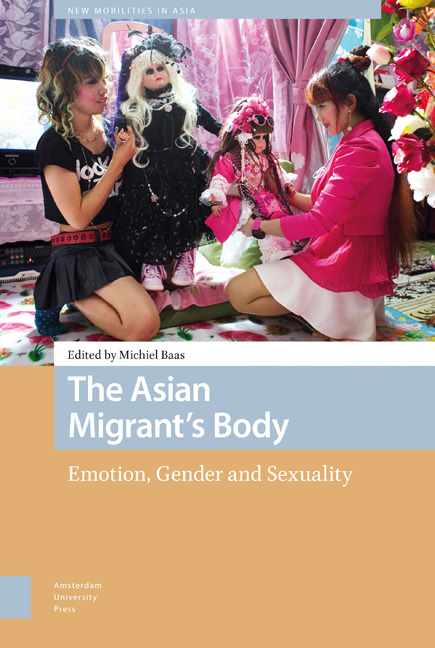Book contents
- Frontmatter
- Contents
- Introduction: Conceptualizing the Asian Migrant’s Body
- 1 ‘Not a Lesbian in Dubai, Not gay in Tehran’: Sexualities, Migrations, and Social Movements across the Gulf
- 2 Bodies at Work: Gendered Performance and Migrant Beer Sellers in Southeast Asia
- 3 Body, Space, and Migrant Ties: Migrant Domestic Workers and Embodied Resistances in Lebanon
- 4 The Day Off Policy , ‘Reverse Domestication’, and Emotional Labour among Indonesian Domestic Workers in Singapore: Maria Platt, Brenda S.A. Yeoh, Khoo Choon Yen, Grace Baey and Theodora Lam
- 5 Embodying the Good Migrant in Ageing: Negotiating Positive Subjectivities Through Paid Work
- 6 Proper Conjugation of Bodies: Chastity, Age, and Care Work in Sri Lankan Migrants’ Families
- 7 Border-crossing as Sexual Subjects: Interracial Dating Experience of Young Chinese in New Zealand
- 8 Managing Touch: The Racialized Dynamics of Intimacy in the Los Angeles Beauty Industry
- Notes on Contributors
- Index
6 - Proper Conjugation of Bodies: Chastity, Age, and Care Work in Sri Lankan Migrants’ Families
Published online by Cambridge University Press: 23 June 2021
- Frontmatter
- Contents
- Introduction: Conceptualizing the Asian Migrant’s Body
- 1 ‘Not a Lesbian in Dubai, Not gay in Tehran’: Sexualities, Migrations, and Social Movements across the Gulf
- 2 Bodies at Work: Gendered Performance and Migrant Beer Sellers in Southeast Asia
- 3 Body, Space, and Migrant Ties: Migrant Domestic Workers and Embodied Resistances in Lebanon
- 4 The Day Off Policy , ‘Reverse Domestication’, and Emotional Labour among Indonesian Domestic Workers in Singapore: Maria Platt, Brenda S.A. Yeoh, Khoo Choon Yen, Grace Baey and Theodora Lam
- 5 Embodying the Good Migrant in Ageing: Negotiating Positive Subjectivities Through Paid Work
- 6 Proper Conjugation of Bodies: Chastity, Age, and Care Work in Sri Lankan Migrants’ Families
- 7 Border-crossing as Sexual Subjects: Interracial Dating Experience of Young Chinese in New Zealand
- 8 Managing Touch: The Racialized Dynamics of Intimacy in the Los Angeles Beauty Industry
- Notes on Contributors
- Index
Summary
Abstract
Physical and symbolic aspects of bodies limit the migration trajectories of female domestic workers from a Buddhist community in coastal Sri Lanka. Government regulations and family decisions regarding women’s overseas labour draw upon and in turn influence discourses about gender, sexuality, age, health, and class. This ethnographic analysis illustrates that local norms task women with nurturing the brains of babies, preserving the chastity of teenage daughters, caring for frail elders, and preventing their working-class husbands from overindulging in liquor or having sex with other women. Successful social reproduction depends on the proper conjunctions of bodies in the extended family. Corporeal and symbolic dangers imagined to arise from women's absence fuel a national-level moral panic about female migration.
Keywords: migrant domestic workers, female overseas labour, chastity, social reproduction
Introduction
Women have migrated from Sri Lanka to work in the Middle East for the past thirty years as temporary labourers (B. Brown 2011; Frantz 2008; Gamburd 2000; Näre 2010). Large numbers of female migrants work as domestic servants in Saudi Arabia, Kuwait, and the United Arab Emirates. These working-class ‘housemaids’ make up the vast majority of migrant Sri Lankan women (SLBFE 2017).
Since this trend in labour migration began, social commentators have lamented the risks posed to women and the social costs borne by their families. At times, concerns have reached the level of ‘moral panic’, when the unethical behaviours of or potential dangers to a particular group of people purportedly threaten the very foundations of society (Lynch 2007). For example, an editorial in the Daily Mirror(2015a, A8) entitled ‘Stop the Abuse of Lankan Mothers and Girls’ sums up what Sri Lankans supposedly ‘know’ about the situations (and bodies) of migrant women and their family members:
About one million young Sri Lankan mothers and girls … go to the Middle East for work. Reports say most of them are required to work like slaves for about 20 hours a day … Reports indicate that thousands of Sri Lankan women and girls are sexually abused by the men in the families which they work for. In many cases there are tragedies in the families here also when the mother goes away leaving the father with young daughters to look after. Often there had [sic] been reports of sexual abuse leading to the break up [sic] of thousands of families. (Daily Mirror 2015a, A8).
- Type
- Chapter
- Information
- The Asian Migrant's BodyEmotion, Gender and Sexuality, pp. 135 - 160Publisher: Amsterdam University PressPrint publication year: 2020



